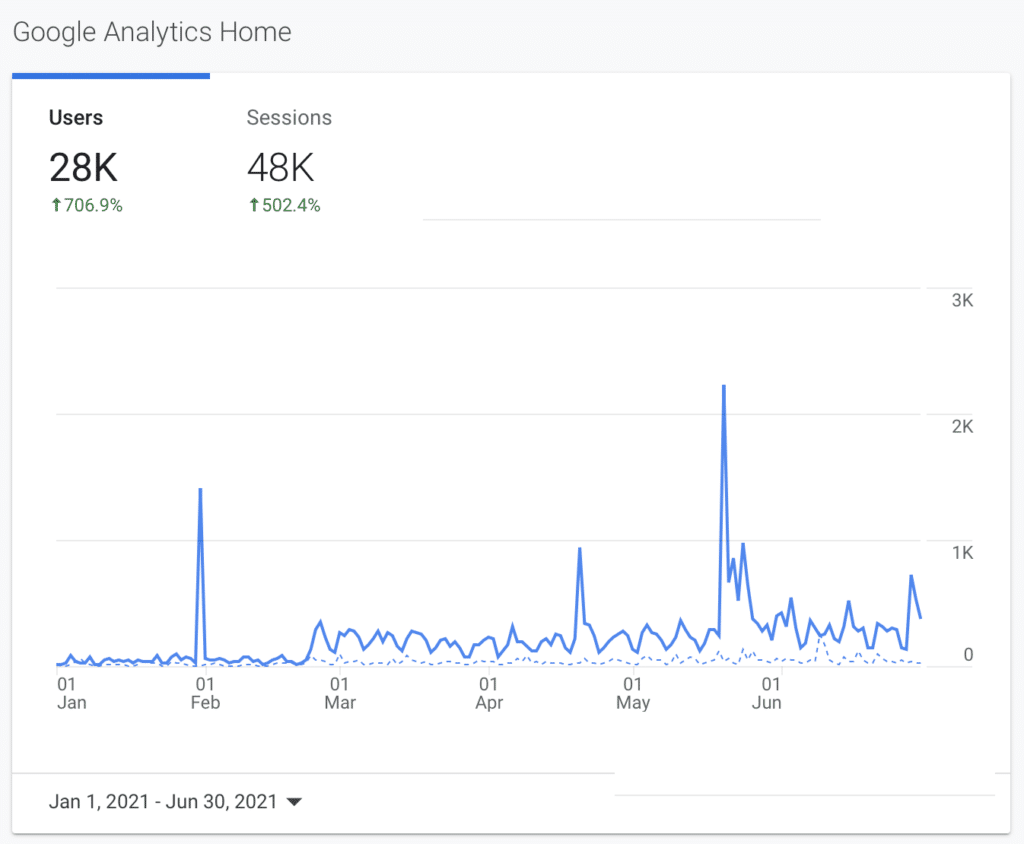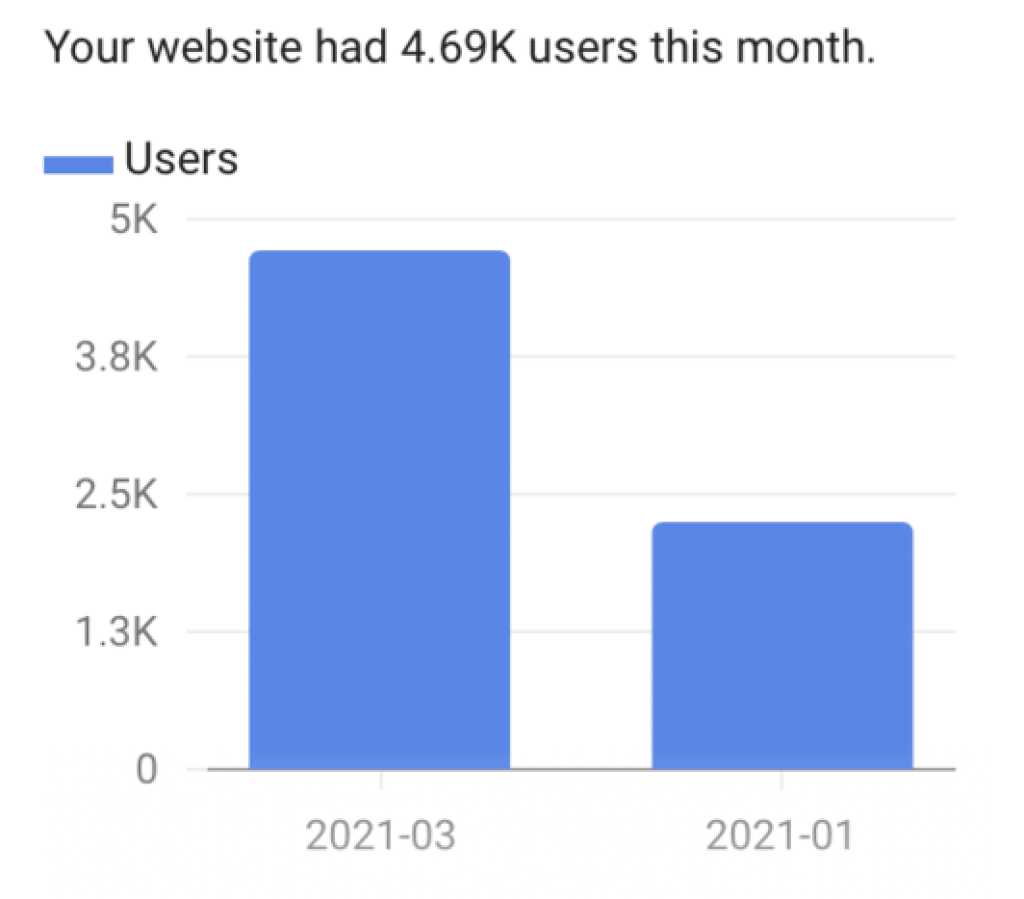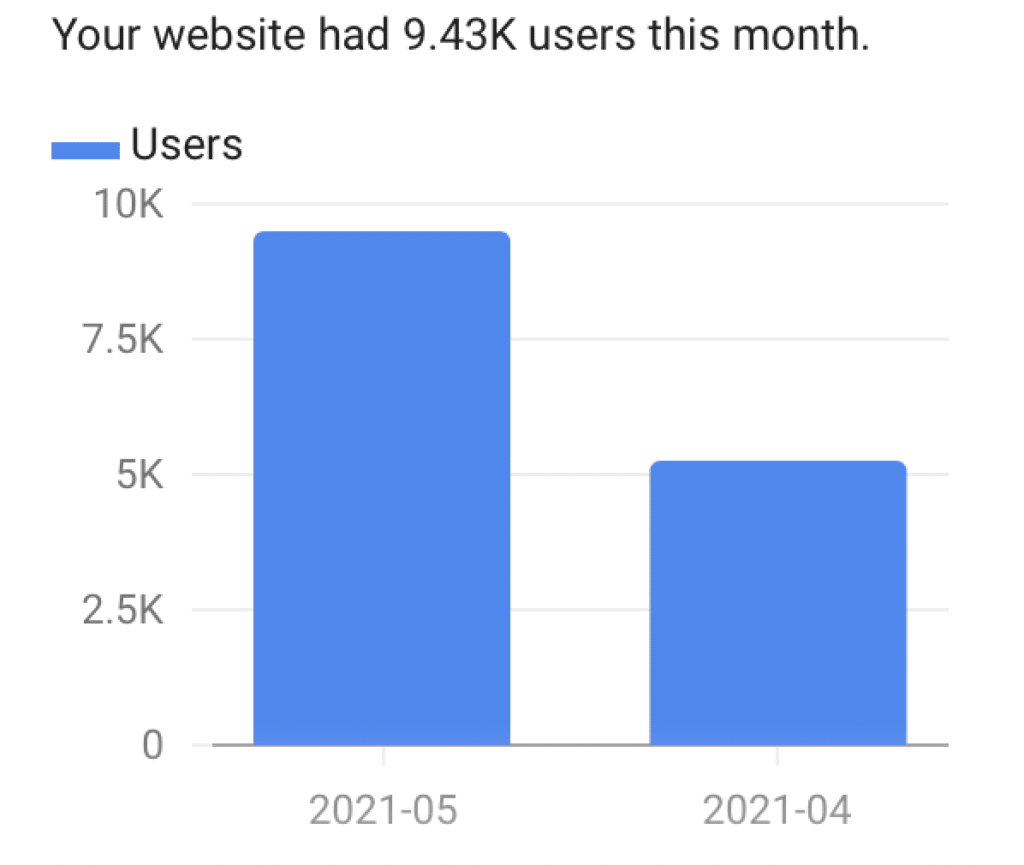The 1/2 year mark of 2021 is a good moment to reflect on the current status of Foojay.io (a central resource for the Java community’s daily information needs, a place for friends of OpenJDK, and a community platform for the Java ecosystem — bringing together and helping Java professionals everywhere), and to look at where we are and where to go next!
First, some data! Here's the Google Analytics graph showing total unique visitors to Foojay.io over the past half year, with several interesting spikes, explained in detail below.

Understanding the Data
It should be noted that Foojay.io was launched in April 2020, gradually building out from initially only providing OpenJDK release notes in the form of the OpenJDK update and release details, then to incorporating Marc Hoffmann's Java Almanac and the integration of Chris Newland's JVM Options Explorer, after which Foojay.io Today was added, as well as the several other features, such as the Java Events Calendar and the Foojay Pedia of frequently used/confused OpenJDK terminology.
Only from February onwards has real promotion of Foojay.io begun, since that's when the Foojay Board was launched (now consisting of Azul, Datadog, DataStax, Hazelcast, JFrog, Payara, and Snyk), so that in February Foojay.io became an authentically community-driven project enabling it to be promoted for the first time, shortly followed by the first community event, which was the two-day Foojay conference consisting of the Foojay Dev Room at FOSDEM 2021 (which explains the first big spike above in February), followed shortly thereafter by the Foojay Virtual JUG Tour in March and April (many thank yous go to Ari Waller from JFrog for the incredible work on networking and on logistics and to Jadon Ortlepp and his team from Payara for organizing the awesome social media cards), combined with the Virtual Field Trip at the University of Pforzheim. These 20+ events, done over the space of two months, across the world, sometimes multiple events per week, explain the up and down movement above in March and April.
Here's a map of the 20+ JUG visits across March and April, all done virtually, of course, with a large cross-section of the Java community and its technologies involved:

After that there were a number of significant spikes, in the graph above, which can also be explained: the big spike towards the end of April is because of Wim Deblauwe's brilliant and very well received "Better Error Handling for Your Spring Boot REST APIs", while the massive spike in May is because of Deepu Sasidharan's fantastically explained and comprehensive "Demystifying JVM Memory Management", these two articles were extremely well received, really popular on Reddit, for example, as well as elsewhere, drawing a lot of traffic to Foojay.io, not to mention the hot discussions around JEP 411 and the deprecation of the SecurityManager, with Peter Firmstone providing great content around this theme, such as "The Principle of Least Privilege and How JEP 411 Will Have a Negative Impact on Java Security".
It is also noticeable that a lot of JavaFX-related content is finding its way onto Foojay.io, indicating that there really is a lot of innovation going on in that part of the Java ecosystem, a combination of the possibilities provided by game development via FXGL by the amazing Almas Baimagambetov to the multiplatform JavaFX support provided by Gluon, to the enthusiasm around that combination together with Raspberry Pi by the inspiring Frank Delporte, while beyond the areas of JavaFX, the Java security domain has been excellently and thoroughly covered by Brian Vermeer from Snyk, microservices and beyond by Jadon Ortlepp from Payara, IntelliJ IDEA by Helen Scott from JetBrains, VS Code by Yaojin Yang from Microsoft, and simply cool and cutting edge performance-related content by Nicolas Frankel from Hazelcast. Well done to one and all. Thank you, Wim! Thank you, Deepu! Thank you, Peter! Thank you, Brian! Thank you, Frank! Thank you, Almas! Thank you, Nicolas! Thank you, Helen! Thank you, Yaojin! Thank you, Jadon! And well done, every single other individual contributor (just too many to name individually) for providing such strong content, day after day, week after week, month after month!
Month-By-Month Growth
Let's also look at the month-by-month growth of Foojay.io. The first graph shows that between January and March this year, i.e., over the space of two months, total unique visitors doubled:

That doubling effect, which took two months, i.e., from January to March, took half as long to achieve again just one month later, i.e., from April to May:

Thank You, Everyone!
In short, the trends are what one would hope... and they indicate that we're doing well as a community, that there is significant momentum, and that there's a lot to be gained in collaborating with Foojay.io, by publishing or republishing content here. Foojay.io is living up to its ambition to be a central resource for the Java community’s daily information needs, a place for friends of OpenJDK, and a community platform for the Java ecosystem — bringing together and helping Java professionals everywhere.
Thank you to everyone involved, the dozens of contributors from across the Java ecosystem, the many organizations involved, in one way or another, including Payara, Snyk, Hazelcast, JFrog Jelastic, JetBrains, Datadog, DataStax, and beyond, the community managers, the enthusiastic participation of so many individuals (REALLY too many to mention, you know who you are) in discussions on the Slack channel and Twitter, the many JUGs who welcomed Foojay.io throughout March and April so very warmly and enthusiastically, Professor Thomas Schuster and the University of Pforzheim for the virtual field trip (one of many of such future trips), and the great Java technology press reception such as by John K. Waters from ADT Magazine!
Many thanks also to specific people at Azul, you know who you are, including, among many others, Pavel Petroshenko, Betsy Rhodes, Gerrit Grunwald, and Carl Dea, as well as (maybe more than anyone for being so flexible and adaptable and open to all our smallest whims) the development team of Slava, Vigen, and everyone at Yelk.
Quotes
"Foojay is an example of the strength of the Java community that is greater than any single company and is composed of active, passionate, and caring individuals who want to share their expertise and help mentor the next generation of developers." — Stephen Chin, Head of Developer Relations at JFrog (on Foojay Board page)
"It’s incredibly important for every ecosystem to have a core location for information to help grow the community and be an educational resource for all developers to use. Java has lacked this core space for many years." — Simon Maple Field CTO at Snyk (on Foojay Board page)
"I like the way Foojay highlights what the Java community is doing. We have missed that." — Johan Vos, Co Founder at Gluon (on Twitter)
Next Steps
The Foojay.io site is under heavy development right now, a new homepage will be released over the next weeks. After that, there are several directions we can go in together—how about a forum, a job board, a newsletter, a real calendar, a code exchange, and Foojay Awards?
How about another virtual JUG tour, this time focused on Java 17, which is just around the corner? How about a tour to universities and colleges, just like we did with the University of Pforzheim? How about using Foojay as a platform to bring in content by students from universities and colleges and to introduce them to the Java community, e.g., see Open Source Tools as an Opportunity for SMEs to Use AI, recently published by Nguyen Pham from Pforzheim. How about regional Foojay tours, especially now that not everything will need to be virtual anymore? How about a campaign specifically to promote the OpenJDK, since that's a logical thing for friends of OpenJDK to do? And... how about some swag?
All this and more is in the pipeline and will be reported on 6 months from now in the next reflection on Foojay.io, a place for friends of OpenJDK!
[…] sessions with steady growth throughout all of 2021. Foojay usage has also doubled relative to the January – June 2021 edition of the […]